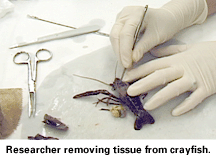| Home / About NWRC / Issues & Capabilities / NWRC Library / Publications / Data & Maps / Staff / Hot Topics / Search / Site Index |
The USGS studies long-term issues surrounding the quality of the Nation's waters. The last decade of the 20th century witnessed the rise of technologies to detect small amounts of chemicals entering our waterways and to detect the influences of these stressors in aquatic ecosystems. Stressors of concern include hormonally active chemicals (such as synthetic estrogen), microbial pathogens, pharmaceutical compounds, and heavy metals. Fish and birds have proven to be good animal models in which to study the effects. NWRC's mission encompasses studying impacts on wetlands and aquatic habitats; therefore, several studies on ecosystem health are being performed. Ecosystem health is reflected by the health of its animals, and studies of their cells can yield quantitative, diagnostic, and predictive information. For parts of these studies, a specialized lab is used and includes the following: microscopic image analysis, fluorescence microscopy, and flow cytometry.
Research

Return to Research Issues